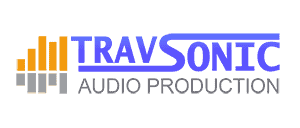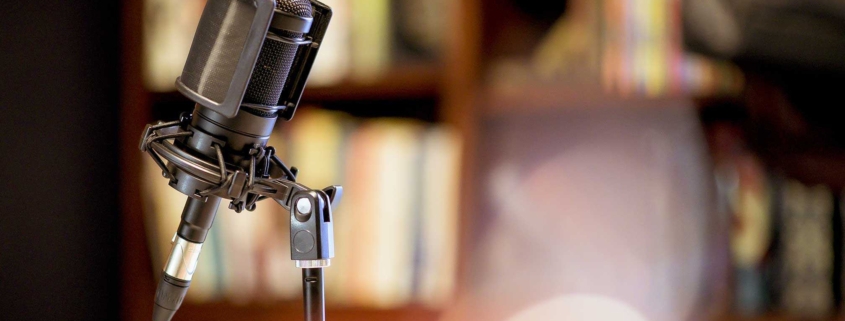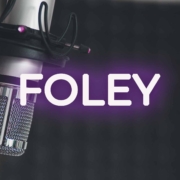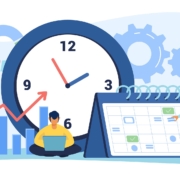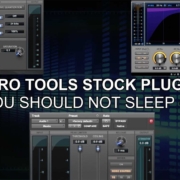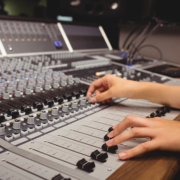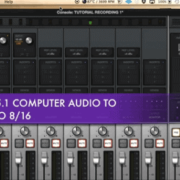The Complete Guide to AudioBook Production & Budgeting
Audiobooks have experienced unprecedented growth in popularity over the past decade, with more and more people turning to audio as their preferred way of consuming content. In 2021, it is estimated that over 130 million people listened to audiobooks in the United States alone – a staggering number when compared to previous years. This surge in popularity is attributed to the convenience of being able to listen anywhere and anytime, as well as the vast selection of genres available.
The process of producing an audiobook is a detailed and extensive process from start to finish depending on the length and complicity. It starts with the production of the script text. Producers then assign a narrator for the recording and finally edit the audio into a cohesive audiobook.
Production services of an audiobook consist of:
- Text preparation
- Voice narrator casting
- Voice recording
- Audio editing
- Proofing
- Audio mastering
- Distribution
Audiobook distribution used to be limited to CDs that could be ordered through the company that produced them. The internet opened up a new world where you can now download almost any book in audio format instantly such as audible.com for example.
What is the production cost of an audiobook?
The cost of producing an audiobook varies based on the company and where it’s produced. An audiobook’s average runtime is around 10 to 12 hours (can be longer) and is charged between $250 to $400 per finished hour collectively. This is to include the amount of production needed from the voice narrator, editing, proofing, and mastering. The more staff and services needed, the higher the per finished-hour rate will be.
How many words can be read per hour?
In general, a voice narrator can read about 9,000 to 9,400 words per hour. If a book has about 50,000 – 70,000 words, it will take around 6 to 8 hours. This does not include sound editing, proofing, and mastering time. 8 hours of recording in one day is a lot for a voice narrator. So, the audiobook recording may be separated into 2 or 3 days.
Price Factors
The price depends on many factors such as how much the voice talent charges. If the workers are union and the type of studio. This makes the average production budget for an audiobook between $2000 to $5000.
Sometimes the author has recorded the narration and just needs it edited, you can expect to pay $150 per finished hour. This will calculate to be around $800 to $1500 depending on the estimated length of the audiobook. Learn more about our audio editing services.
Average Base Rates for Audiobook Production
- Narrator: $90 – $200 PFH (can be more if union)
- Audio Editor & Mastering: $90 – $150 PFH
- Proofer: $30 – $75 PHF
With these base rates, you can estimate the total audiobook production budget. It also depends if you are doing multiple roles such as audio editing and proofing together. This would lower the total budget. But, in this case, we will assume full production is needed and you won’t be doing the services.
In this scenario, we have a 70,000-word book. With an average of 9,000+ words equaling a runtime of about an hour, we can estimate the audiobook will be just under 8 hours.
By calculating an average of all the PFH services for the narrator, audio editing, and proofing we come to a mid-range base rate of $350 PFH. Multiply $350 by 8 and you come to a production price of about $2800.
The Voice Narrator
Audiobook narrators are often professional voice actors who have experience reading aloud, which makes them perfect for this job. However, at times, it is common for the author to narrate their book such as non-fiction where it’s expected to hear the author’s voice.
Narrators also need to have a pleasing voice with an excellent range of inflection and intonation, as well as a wide array of accents to read. The narrator might need to mimic different voice characters as well that are in the book.
As soon as the studio receives approval on the script text, they’ll begin work on recording the full performance.
How is an Audiobook Recorded?
An audiobook recording is often done in a soundproof booth in a recording studio environment. The recording has to be clear of background noise since the final product will be primarily voice-focused. This is normally accomplished in a quite soundproofed facility designed for voice recording.
Some studios and producers opt to have the book text on a tablet or iPad so page turns and arranging of the pages do not end up in the recording. It is difficult and time-consuming for the audio engineer to remove page turns and unwanted sounds.
Audiobook distributors and online outlets have strict specs for the final audio production. It is important to take every step to ensure the audio is of the best quality.
What is the recording process?
Generally, the voice actor records the book in segments such as chapter by chapter with session breaks. Each chapter can take about 1 hour to record depending on the length of the text and narrator.
The recording is normally done without stopping chapter by chapter. This is to ensure the tone and read stay consistent. If the narrator makes a mistake, he or she will pick up from the previous sentence. The audio engineer will make a marker of the section where the mistake was while the recording still rolls.
Once the narrator has finished the full recording, the recording is submitted for audio editing. The director will include any notes to be added to the audio engineer’s notes.
Audio Editing and Cleanup
Production editing is where all the audio is organized, edited, and cleaned up to make a final product. This helps make sure that all audio is clear and audible to create an easy-to-follow experience for the listener.
Audio engineers have software tools and knowledge to remove problematic audio issues such as:
- Narration pacing
- Mouth clicks
- Excessive breaths
- Background noise
- Page turn sounds
- Rustling noises
ACX Requirements
If you are distributing your audiobook on Audible/ACX or other platforms, you’ll need to format the audio files to the required specs. Not doing so will ultimately have your audiobook rejected and sent back to be fixed.
These specs include having a uniform sound, containing opening and closing credits, having all mono or stereo files, and a retail audio sample.
In addition, each file should contain only one chapter. Each chapter should have a few seconds of room tone at the beginning and end. The narrator must state the name of the chapter or section at the beginning. If a chapter is more than 120 minutes, it will have to be broken up into 2 audio files and labeled accordingly.
After the editing of the audio files has been done, next is proofing to make sure there are no mistakes.
Proofing Process

Photo created by pch.vector – www.freepik.com
Audiobook proofing is the process of listening to an edited audiobook critically and in detail. Preferably, the edited audio will be listened to through headphones to hear how the consumer would. Reviewing is done per chapter and then comments are added or it is approved for mastering.
Generally, for each finished hour of the audiobook, you will need to spend 1.5 hours proofing. Following along with the audiobook script while proofing the audiobook can be helpful to find mistakes that you wouldn’t have.
What are you looking for during the proofing process?
When you proof audio for an audiobook, you’re listening for:
- Repeated phrases
- Consistent Narration
- Erroneous sounds
- Missed pronunciation
- Gaps in sections
- Editing mistakes
- Page-turn sounds
The Mastering Stage
After all the audio editing and proofing are finalized, it is time to send it to mastering. This is when all the audio files are put together and the audio is mastered to the required specs of the publishing service. During the mastering process, the following is addressed:
- Same tone
- Consistent level per file
- Sample rate conversion
- Fix problematic frequencies
- Add required metadata and ISRC codes
Audiobook Distributors
Now that the production is finalized, it is time to send it to the distributor. Here is a summary of the top online audiobook distributors.
1. ACX
Audiobook Creation Exchange is a marketplace for professional narrators, authors, agents, publishers, and rights holders to connect and create audiobooks.
ACX is Audible’s (owned by Amazon) full-service audiobook production and distribution center. You can distribute to Amazon, Audible, and iTunes.
2. Findaway Voices
Findaway Voices provides audiobook production and distribution services. The website champions an open audiobook market where authors and publishers choose where to sell their audiobooks and at what price to sell them.
3. ListenUp
ListenUp Audiobooks has been one of the publishing industry’s top audio production companies. Provides a full range of audio production services for audiobooks and can handle the most complex productions.
4. Author’s Republic
Author’s Republic is a global leader in digital content delivery with the industry’s largest B2B audiobook distribution platform.
Those are the basic guide to publishing your audiobook. Of course, more goes into it between the lines. Audiobook production and distribution are generally closely linked due to exclusivity. We hope this article has helped to clarify the steps so you can easily evaluate how to take the next step in your audiobook production journey.
